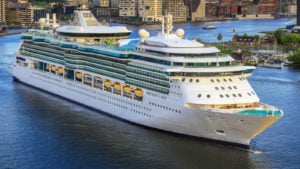While volatility is on the rise in broader markets, investors wonder if now could be a good time to buy Royal Caribbean (NYSE:RCL). After all, like many other battered travel and cruise names, RCL stock is down over 50% year-to-date.

However, that metric tells only half the story. Since the lows hit in March, the shares have tripled in value, in part due to hopes for a V-shaped economic recovery and the development of a vaccine.
Abhinav Sharma and Juan Luis Nicolau of Pamplin College of Business at Virginia Tech recently conducted a study on the effects of the pandemic on the travel industry. They conclude that while hotels, airlines, cruise lines and car rental agencies have all experienced a deep decrease in valuation, the cruise industry is most affected by the novel coronavirus pandemic.
I agree. At the current price level in RCL stock is unlikely to be sustainable without stable revenue. If you are not currently a shareholder in Royal Caribbean, you may want to wait until the stock declines toward the $50 level, or even below.
Earnings at a Glance
Royal Caribbean’s beginnings to back to 1969. The group currently has 62 ships with an additional 16 on order. It conducts its operations under four brands, Royal Caribbean International, Celebrity Cruises, Silverssea and Azamara. The cruise operator also has a 50% ownership in a joint-venture that operates TUI Cruises and Hapag-Lloyd Cruises.
In early August, Royal Caribbean announced second-quarter results that showed the dire situation the cruise operator was facing. Passenger ticket revenues decreased 94.7% to $107 million, compared to $3.01 billion a year ago. Meanwhile, onboard and other revenues declined 91.3% to $68.6 million, compared to $788.8 million a year ago.
KPMG International notes that cruise ships get 62% of their revenue from ticket sales, while on-board purchase, art auctions and shore excursions make up the remaining 38% of revenue. With cruise ships forced to stay in dock, that revenue isn’t flowing to RCL.
As a result, GAAP net loss was $1.6 billion or $7.83 per share, compared to GAAP net income of $472.8 million or $2.25 per share a year ago. The cruise operator had liquidity of approximately $4.1 billion all in the form of cash and cash equivalents. Interest expense for the remainder of 2002 is expected in the range of $505 million to $515 million.
Finally, due to the pandemic, management withdrew guidance since it was unable to estimate the financial losses due to uncertainties related to the pandemic.
Should You Buy RCL Stock Now?
Regular InvestorPlace.com readers may remember that earlier in August, the cruise industry voluntarily suspended all sailings in U.S. waters until Oct. 31. It’d be extremely hard to imagine a scenario where Royal Caribbean’s Q3 or even Q4 results will be any better than Q2. Another perfect storm may be fast approaching.
The 52-week price range for RCL stock has been $19.25 to $135.32, currently sitting just above $60. Both from a fundamental and a technical chart perspective, the stock looks overvalued and overbought at these levels. Given the volatility and selling pressure in broader equity markets, too, in the coming weeks, RCL stock is likely to fall toward the $50 or below.
If you are not yet a shareholder, you may want to wait until there is more visibility as to when cruises can become operational again.
If you own RCL stock and have paper profits, you may want to take some money off the table. Or if you are an experienced investor in the options market, you may consider hedging your position.
For example, you may use a covered call strategy with approximately a two-month time horizon, i.e., Nov. 20 expiry. Such a covered call position would decrease portfolio volatility and offer some downside protection. You would also be able to participate in a potential up move.
The Bottom Line
Passengers from the U.S. and Europe comprise around 75% of cruise revenues. While these two regions are currently working hard to contain the spread of the second wave of Covid-19 infections this fall season, domestic and international travel still remains at highly depressed levels.
It’d be premature to assume cruises will be sailing again close to full capacity any time soon from U.S.- or Europe-based locations.
Therefore, investing in cruise operators like RCL stock may still be risky. However, if you are interested in investing in travel stocks, especially when the current selling-pressure eases, you may research several exchange-traded funds. They may provide either indirect or diversified exposure to the industry. Several examples would include the ETFMG Travel Tech ETF (NYSEARCA:AWAY), Invesco Dynamic Leisure and Entertainment ETF (NYSEARCA:PEJ), U.S. Global Jets ETF (NYSEARCA:JETS), Invesco S&P 500 High Beta ETF (NYSEARCA:SPHB), First Trust Consumer Discretionary AlphaDEX Fund (NYSEARCA:FXD) and Host Hotels & Resorts (NYSE:HST).
On the date of publication, Tezcan Gecgil did not have (either directly or indirectly) any positions in the securities mentioned in this article.
Tezcan Gecgil has worked in investment management for over two decades in the U.S. and U.K. In addition to formal higher education in the field, she has also completed all 3 levels of the Chartered Market Technician (CMT) examination. Her passion is for options trading based on technical analysis of fundamentally strong companies. She especially enjoys setting up weekly covered calls for income generation. She also publishes educational articles on long-term investing.
